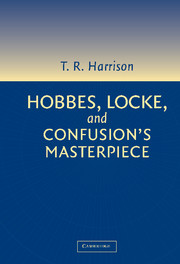 Hobbes, Locke, and Confusion's Masterpiece
Hobbes, Locke, and Confusion's Masterpiece 9 - Why Utility Pleases
Published online by Cambridge University Press: 05 June 2012
Summary
‘The cause too, why utility pleases, has of late been assigned by an ingenious and agreeable philosopher, who joins the greatest depth of thought to the greatest elegance of expression’. This is a quotation from 1759, so we have moved on to the next century. It is in fact from Adam Smith [Theory of Moral Sentiments IV.1.2], and the ingenious and agreeable philosopher he is describing is his fellow Scot and friend David Hume. Elegance of expression, agreeable philosophers, admiration of utility – it all seems to be a new and different world, far from the blood- and Bible-stained conflicts we have been describing. So, or so at least the first superficial glance might suggest, we have moved into the modern world, the start of our own times. We have science rather than religion, enlightenment rather than confusion. However, what I shall show in this final chapter is that it is not that simple. I aim here to discuss continuity rather than difference; I aim to connect the people we have studied with these later elegant and agreeable admirers of utility.
I had originally thought of calling this chapter, ‘What's the Use?’ For I want also in this chapter to reflect more generally on the possibility of political philosophy and on the use for political philosophy of the historical philosophers I have been describing. Only if we can connect will this thought be of use.
- Type
- Chapter
- Information
- Hobbes, Locke, and Confusion's MasterpieceAn Examination of Seventeenth-Century Political Philosophy, pp. 245 - 266Publisher: Cambridge University PressPrint publication year: 2002


